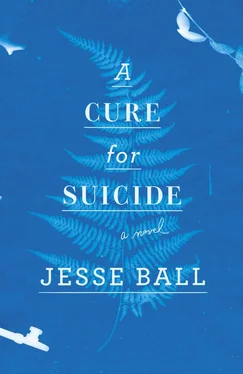I am not crying, she insisted. I had found her in an upstairs bedroom, and she was curled on the bed, shaking. You are not crying, I said, but your face is wet. Her face was wet, I told the interlocutor, and she had been crying, but I didn’t know why. I used my sleeve to wipe her nose and mouth, and kissed her, and I did everything I could to comfort her there. When we made love, I said quietly, it was a brutal, brutal thing. It was never easy. It was an intimacy so terrible that it left us both reeling. The first time we did, in my room at the boardinghouse, we could neither of us move for some hours. We lay there, entirely spent. When I found her in the upstairs room, it was almost the same. It was as though there were little walls that would spring up, again and again, between us, and the moment of our physical love was the actual breaking down, the shattering of them. She frequently would cry, abjectly weep, and it would be terror and grief that would turn to joy or joy to grief. She said to me, once, afterward, that she thought nothing physical should ever be easy. It should all be difficult. It should all be done with the maximum effort, utterly helplessly. I said that I would do, as always, exactly what she thought was right. She said, don’t do anything I say, ever. She turned her face away from me. She was crying again and could not be comforted. We rose after an hour or two and went and saw to the house. It was a hunting lodge. I hadn’t been in a hunting lodge, didn’t know there were hunting lodges, but it was one. There were various trophies on walls, and guns in places. There was a mudroom, and natural wood chairs and rocking chairs on long porches that knelt to the ground. The trees were fabulously old, older than practically any trees I had seen in quite a long time, and the house had apparently been built amongst them. The porch had a tree halfway through it that supported the porch roof. See, she said, here is what I wrote in the tree, and she showed me her name there. Raina. I wrote it this way when I was, when I was, it would have been, from nine to eleven. I wanted some self-determination, so I changed my name. Then, a dreadful thing happened. What? A girl came to the school where I studied, and her name was Raina. I didn’t like her at all. She was extremely vulgar, but she liked me, and she liked that we were alike. I remember the teacher saying her name, saying it unnecessarily in my presence, just so I would know that there was another Raina about. I was horrified, disgusted. So, I changed my name back. But, here it is. You should put your name here, she said. She took a little knife from her bag and I opened it and cut my name into the tree. Clement, I wrote. See, I said, I didn’t spell it differently, but I thought I might. You thought you would, she said, but when it came to it, you like your name. You couldn’t write it differently. There is a sacredness to names. Sacredness, I said the word over. Sanctity, she said. I guess sanctity is the word, but it feels like the meaning is wrong. You are better now, I said. You aren’t sad anymore, I told her. You appear fine, I said out loud to Rana, so I told the interlocutor. I don’t know if I wanted her to be fine, or whether she was fine, but while we were there, I kept watching her to see if she was sad, and when she was sad, I would smile and divert her mind, and when she was happy, I would say, helplessly, I would say, oh, you are happy again. If anything, this reminded her of her sadness. I couldn’t tell what it was, and she wouldn’t say. There was a telephone there, but she wouldn’t use it to call anyone. When I suggested it, she said, no, we have come here, and now I don’t want to go anywhere, to be anywhere but here. This is the place for us. We have this house, and the little town nearby where we can buy our groceries. Tomorrow when we get up, we’ll walk into the town. I feel weak now, but tomorrow, I think I will feel stronger. And when some hours had passed, she felt strong enough that we went up a ladder to the roof of the hunting lodge, where there was a sort of viewing platform. We can sleep up here, she told me. There is a thing that happens, if you are very still. The bats pass by overhead, just inches away. I went and brought up some sheets and a pillow. I found a pile of old coats, and I brought them up. We can sleep on these. This was my coat, she said. She held one up. Look, I can still fit in it.
The truth is, I said to the interlocutor, she was perfectly right. When she mentioned the possibility of bats, I did not entirely believe her. I thought she might be speaking metaphorically, or just exaggerating a childhood memory that would never need to bear any proof. However, when we lay there on our backs, looking straight up into the night sky, bats flew past. They flew past. A fabric of stars such as you have never seen, impossibly far, and yet spread before you so clearly, all from right to left and up and down. You felt it had been placed there, so particularly were all these distant objects put into relation to one another. And then — bats, just inches away, tearing past. She said that it would happen, and it did. The bats flew past — not one or two, but dozens and dozens. It went on for at least an hour, just at sunset. I can’t believe it, she said to me, clutching at my arm and pushing against me. She pulled herself up until she was on top of me, and her nose pushed into my cheek. She said, all these years and it is just the same, the bats pass overhead. I imagine they come out of the same caves, they live in the same colonies. I imagine these bats are descended from the bats that I knew, the bats that passed just inches above my face on summer nights fifteen years ago. Once, she said, my brother and I set out one morning to go and find those caves. We told my father. We put on our coats and packed a rucksack, and set out, and there on the porch, where he was sitting, reading, we told him we were off to find the caves. He bid us goodbye and told us that if we found them, there would be a choice then. It is the choice that people have when they find the thing for which they are looking. Will you come back. Then, my father said, you should decide in our favor, in what I would call our favor, in favor of the continued life of our family, and come back. You should not stay there with the bats. I will definitely stay with the bats, my brother said, if we find them. In that case, said my father, I take back my blessing. I hope you wander lost for some hours, and then stumble back here in time for supper. Of course, Rana continued, that is what happened. We had an idea of waiting until dark and using a flashlight to judge the direction of the bats’ flight, but we grew afraid as the night started to fall. When supper came, we were both to be found at the table. I assume, then, my father said, that you did not find the bats, as I hope that you are now, and will always be, a man of your word. This he told my brother, regarding my brother’s proposed domiciling with the bats. You have to understand, Rana said, that all of this is very funny. To my family, it is very funny. It is also something we never would laugh about, or talk about, or even mention. I only tell it to you now so that you can get to know me better. I want you to know me. She threw herself onto me, biting and scrambling with a feigned indignation.
In the morning we woke early, as everyone does who sleeps outside, and she said that she felt strong. This was a thing that sometimes came, whether she felt strong or weak, and we would change our plans accordingly. In the city, I had seen her every day, but not all day, and I imagined, standing there beside her at the hunting lodge, that I had not had the whole picture. She had, in the city, as a way of course, saved her strength so that she was always feeling strong when she saw me. The other things that she said she had been doing in the day, perhaps she had not been doing all of them, or at the very least not with her whole strength, and with breaks. Now, though, in the morning, we stood there in the morning light looking off down the mountain, she had her strength, so she said, and we were to walk in the town. This I told the interlocutor. Where the town was, it was positioned nearby the hunting lodge. Her father, being a boy at the time, had romantically been drawn to places not in the town. His parents had both died in the town. He preferred, then, living with his aunt and guardian, to move to a place beyond the town. Yet, he wanted to be able to observe the town. He had lived there all his life. The town was what he knew. He wanted to be near it, and yet to be apart from it. He took up residence in the hunting lodge, and modified it, with his own plans and the help of architects. He built the porch out into the trees. He raised a platform on the roof. He extended the back to reach out over a stream, so that there is a room actually in the house through which a stream flows. Rana told me all this as we walked into the town, I explained. She loved her father dearly, I could tell. How did it happen, I asked, that his parents died. My grandparents, she said. Yes, your grandparents. Sitting there, speaking of grandparents with a man who looked like my own grandfather, I felt an odd resonance. Perhaps once, I would have said it out loud, actually confronted this person to whom I was speaking, explained it to him, but I was weary and I felt very old. That, I did say out loud. I said to the interlocutor, I feel old. It’s the thing that is most often said to me, he replied. But it isn’t you that is old. You aren’t the thing that needs to change. It’s that you are overcome by your situation, by the way the world has descended on you. There is much in you that is young and new — and not just in you. In any person, even the oldest conceivable person. That’s what it means to be living — to engage with the cacophony of objects. The interlocutor handed me a cloth to wipe my face. Can you repeat, he said, the last portion. You were speaking very quietly and I couldn’t hear you very well.
Читать дальше












